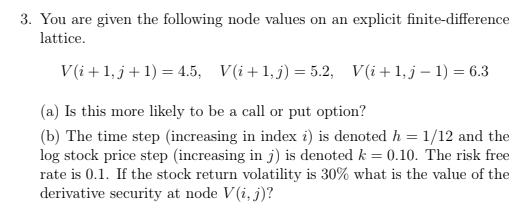Answered step by step
Verified Expert Solution
Question
1 Approved Answer
3. You given the following node values on an explicit finite-difference are lattice V(i1,j14.5, V(i+1,j)= 5.2, V(i+1,j - 1) 6.3 (a) Is this more likely

Step by Step Solution
There are 3 Steps involved in it
Step: 1

Get Instant Access to Expert-Tailored Solutions
See step-by-step solutions with expert insights and AI powered tools for academic success
Step: 2

Step: 3

Ace Your Homework with AI
Get the answers you need in no time with our AI-driven, step-by-step assistance
Get Started


